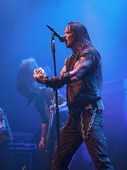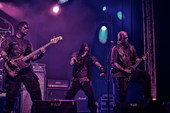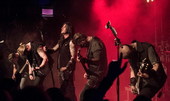Thyrfing
At Our Own Pace
31.05.2022
Архив интервью | Русская версияSince 1995 the incomparable Swedes of Thyrfing have been setting the example of what real Scandinavian Viking metal should sound like. All these years the band has been quite active, especially in terms of live performances, and the intense sound of their new album “Vanagand” (2021) only confirmed their ability to produce assertive and colorful material. Moreover, Thyrfing finally decided to shoot their first videos and even start brewing their own ale. It is noteworthy that “Vanagand”, which contains 8 songs, is their 8th album released after an 8-year break! And considering the fact that during those 8 years I have seen 8 Thyrfing shows in different countries, I could not help talking to them about this and that. As a rule, it’s founder and guitarist Patrik Lindgren who does all the interviews, but this time I was lucky enough to get my questions answered by drummer Dennis Ekdahl, guitarist Fredrik Hernborg, and vocalist Jens Rydén. It’s a pity that one of the founders, Joakim Kristensson couldn’t join us, but instead, Thomas Väänänen, who wаs on vocals until 2006, was willing to take part.
First of all - congratulations on the release of “Vanagandr”, your 8th LP which turned out to be a real success, it was one of the significant things that happened in 2021. Are you satisfied with all the feedback, did it meet your expectations?
PL: Thank you! Yes, the feedback has been overwhelmingly positive. It seems to be some kind of consensus both from long-time fans and new listeners that the album is a very strong one.
Why did it take you 8 years to complete the album, did the pandemic put off your plans? Or did you just take your time and went at your own pace?
DE: We just went at our own pace and we did not suffer so much from the pandemic, since it was much easier to book a studio, and we didn’t need to stress anything.
It was such a surprise to hear about your own Thyrfing ale! Whose idea was it to brew it? Can it be bought at Systembolaget and is it there to stay, at least for several years? Do you see it as a nice way to promote the band or rather to please your fans?
PL: The idea came from us. We approached a few possible cooperative partners for it, and pretty soon we got in contact and got a good thing going with Tempel Brewhouse. Yes, it can be bought at Swedish Systembolaget, and by the look of it now also in Finland. We’ll see … as long as there is an interest and it sells well it will stay I think? There are many layers to it … in one way having your own beer has a kind of romantic shimmer to it … you can’t deny that. Also, it can be a good promotional thing of course … so a combination of that and a nice thing for yourself to do I would say. It’s nothing rare these days, and seems almost more common to do it than not, but still it feels like a nice thing to put on your shelf.
What did you miss most about not being able to play live during the pandemic and how did it feel to do it again?
PL: I enjoy almost everything about the live thing … rehearsing, spending time together, traveling, playing … even though the best part is obviously being on stage actually playing. So, yes for me it’s been highly missed and it felt great being back on stage again!
You’ve given lots of shows worldwide. Looking back, what were the most memorable ones?
FH: We’ve had a lot of fun together on most of the adventures. Most memorable memories for me are the larger festivals and the more exotic shows. Wacken, Party San and Summer Breeze were awesome. And when we visited Russia the first time in 2013, Brazil and 70.000 Tons of Metal made the most powerful impacts and lasting memories.
You played the whole album “Vanagandr” at your shows this spring, how did it feel to play brand new songs after such a long break? Was the reception very positive?
PL: Yes, it was a bit double-edged … the first show in 2 years, first show playing the new material and on top of that the whole album. But I think it turned out good, we had prepared well and did as good as we could hope for. We heard nothing but positive things about the idea of doing the whole album. This is one of those ideas that maybe sounds better to the bands than the fans he-he … playing the latest album from front to end. But I think it felt motivated in our case, we had been playing the older songs for many years without any new material out, so now when we finally had a new album we thought we should really give it a chance in a live environment as well.
When I first met Thyrfing in Moscow in 2013, “De Ödeslösa” had just come out and also your keyboard player, Peter Löf had just left the band so actually I’ve never met him, but the five of you still stick together. You all have quite different background and personalities, but how important is it to have the same values and to share them in the band (and what are they exactly)?
PL: There is indeed some kind of vague ”code” that exists within a band, that everyone must align to in order to make things work. Basically things such as what the band should strive for, what to achieve and the way to succeed with that … if you cannot agree on those things, it will be very hard in the long run and it’s probably the most common reason for bands breaking up or changing members. We are far from the best band in the world in setting up such values, goals or guidelines in a formal way, but it seems things have generally been working out very smoothly anyway for the current line-up as we have been playing together for 9 years now.
For many people, including me, there is some kind of division in the history of the band – there’s the “Thomas era” and the “Jens era”. Thomas, would you say the same about your life, can it be somehow divided into the time when you were a member of Thyring and after you left the band?
TW: Certainly. Even if Thyrfing didn’t tour or record frequently when I was in the band it was still a big part of my life. We would hang out together even when we were not rehearsing or doing something else directly related to Thyrfing. I moved 5 hours away from the rest of Thyrfing even before I exited the band, so actively being social together became a lot more rare – so there is a “before and after” in my life for several reasons, and those don’t just have to do with Thyrfing, but also with where I live, work and kids. I’ve always been horrible at remembering what year different things in my life happened, so I’m very grateful that I can think “oh right, that was the same year we recorded ‘Valdr Galga’”, and then check in the booklet when that was. I haven’t had that advantage since then.
Back in 2013 I was deliberately searching for bands with lyrics in Swedish, for me your language not only reflected some history of your country but also represented that vast social-cultural space where you lived and created. How does it feel to be ambassadors of Swedish culture through your music and lyrics?
PL: Well, I never thought of myself or ourselves in those terms to be honest … but if it’s true in some sense it’s something to be proud of. We always try to treat the lyrics and language with uttermost respect and in best possible way, and if someone is taking use of that in a positive way it is all good.
Thyrfing’s melodies and rhythms are highly recognizable. I see it as a big influence of the Swedish language which is very song-like, very melodic, with high tones and low tones. What is your perception of this connection, how do you see it from the inside?
PL: That’s a very interesting observation which I’ve never thought of myself. Probably because I’m on the ”inside” then. Historically we’ve had both Swedish and English lyrics with Thyrfing, with a predominant number of Swedish lyrics in later years. So, since then I’ve always been confident that the language is a part of ”our sound” … but more on a vague basis rather than it should be the tonal properties of the actual language. So yeah … a good point and observation there, which might be true indeed.
“Vanagandr” is your third album where you didn’t use English in your lyrics at all. No doubt that Swedish fits the general atmosphere more than English but did it upset any fans? Especially such tracks as “Håg och minne” where you really want to know what it’s about, but you just can’t put your lyrics into machine translation, especially if it deals with mythological subjects.
PL: Not really. At least nothing that I’ve heard of, and I think from reactions there are more positive ones than negative. You can of course speculate from a commercial point of view that English lyrics might have a better impact, but it could also be the other way around… impossible to say. Either way, doing things from a commercial point of view have never been a strength of ours. (smiles)
By the way, I’ve noticed a tendency with some Russian bands (who sing in Russian) to hire professional translators to provide their albums with the lyrics in English printed alongside the Russian ones to make their art more accessible. Have you ever thought of that? Or do you think some die-hard fans can do it on their own and the others just don’t need it...
PL: To be honest, I can’t see us ever doing that. In my opinion they cannot be translated in a decent way. It’s not like our lyrics are linear stories from A to B that can be translated in a literal way. Much of the lyrics are also written the way they are due to the Swedish language and tone, including but not limited to, word games, rhymes etc. that would obviously be lost. I have indeed seen some translations made by fans, and yeah … while I can’t really complain about anything translation-wise, the result is just not something that makes sense or would be of value to anyone in my opinion.
“Vanagandr” as a whole seems to me somehow a bit less dark and more optimistic. Some people say it’s like an old Viking resting on his laurels in Valhalla and singing his heroic songs - is there any truth in that?
PL: Yes, I agree. I don’t know about ”optimistic” as it’s still quite a dark album in many aspects, but the general feeling and spirit is definitely a bit more uplifting and powerful comparing to other albums we’ve made in the second half of the band’s career.
I see “Vanagandr” as a celebration of the tales and stories of Scandinavia, lots of people know Fenrir but you’ve chosen this alternative name for the wolf. The artwork by Niklas Sundin (who did the artwork for “Vansinnesvisor” exactly 20 years ago) is amazing, is the wolf in captivity that “väntan på slutet” in “Undergångens länkar” your new symbol now? Your previous releases featured the sword Tyrfing as a logo, why did you decide to abandon it?
PL: It is indeed the symbol for this album, but for the band as a whole, I don’t know. Probably not. To be honest we had to struggle a bit to get this concept work visually, as the wolf is a creature which is insanely common in metal artwork. At some point we even felt a bit weary of the whole thing and felt we had trapped ourselves in some kind of corner … but luckily, once we re-connected with Niklas he threw some great ideas into this concept and we managed to pull it off. I am not saying it’s something extremely original and unique, but in my opinion we managed to get our own touch to it, that went very well along with the album. For the old logo and the sword … I cannot say we have abandoned it forever, and I am sure it might likely re-appear in some form in the future. But for this release we wanted to have something more simplistic and striking … something that made the name stand out a bit better.
You seem to have dropped your Thyrfing logo for some new visuals. Do you think that nowadays bands have to compete for interesting artwork because people pay more attention to it more than they used to? Or is it going back to the roots before the days of the Internet, when the albums could be bought only based on their cover?
Jens: We designed a new Thyrfing logo for this release, mainly because the old one could be too difficult to read in some situations like festival posters for example. And personally I think that the new logo fits better with our sound. But I like the old logo in many ways too. When it comes to artwork and visuals I guess that we, at least me personally, are a bit old school and appreciate physical copies of albums and really like if it looks nice.
I haven’t given much thought about the importance of album cover artwork nowadays compared to times before music streaming… But I guess that every element in the total album ”package” is of importance in general. Every way to make a potential listener interested is good, and by that I mean for example artwork, logo, photos, stage performance etc.
Dennis, what advantages do you see in your albums being released by big Swedish label Despotz Record?
DE: So far Despotz have been very supportive with everything and have great ideas and are willing to do a lot for both physical and digital releases. One big advantage is that they are from Sweden and feel much closer for us. They want to push us but also really respect our integrity.
You seem to change labels after every album, why is that? Unfortunately there are lots of labels nowadays which only record and release albums but do very little in terms of promoting the bands. However, with Despotz Records you did something new – you made two videos. Did the label encourage you to do it and provide any (financial) support?
PL: I think we’ve had a bit of bad luck regarding record labels to be honest … we did the first four on Hammerheart Records, where things were going quite OK. After the 4th album they scaled down their activities though and told us pretty upfront that they wouldn’t afford another Thyrfing album and advised to start looking elsewhere. So it was not really only our decision there … then we did two albums on Regain Records, which closed down after the 2nd one, so not much of a choice there either … For NoiseArt Records who released ”De ödeslösa”, both parties agreed that we weren’t the best of matches, so we ended our cooperation there by mutual agreement. Now we are on Despotz, and so far so good I would say. They have acquired the rights to our first six albums as well, so needless to say that we hope that this co-operation is something that will last longer. And yeah … they were definitely the driving force for us making these videos which was a good thing.
Dennis, you’re the one who often negotiates about different things outside the band. How did you get in touch with Patric Ullaeus and whose idea was it to make Thyrfing first ever video?
DE: When it comes to making the videos this was something the whole band talked about together and we had a long meeting about whom to work with. Both me and Patrik had contact with Patric Ullaeus and he liked our ideas and music so he wanted to work with us for the videos. I think that it’s important to have videos in this time and if you’re gonna do one, you better do it good!
The videos are very professional, are you proud of them? Was it worth waiting for decades before making your first videos? Do you think these days there is more pressure on bands to make their art more visual, that the imagery behind the music has more value in our “new digital” world?
PL: Yes, I am very happy with them, and they turned out pretty much exactly as we had hoped for to be honest. Indeed it seems that video content (not only traditional music videos, but video in whole) is getting more and more crucial every day. It remains to be seen if the demand will keep increasing, or if there will be a rebound at some point. However, as with everything else it all depends on what your goals are, what you want to present and achieve. Speaking for myself I have never been negative about doing videos, but just dead set on that if we ever do it, it needs to be something really good and not just for the sake of it. Now we finally had the possibilities to do it in a satisfactory way, so yeah, I am really happy about that.
Jens, you’re a professional photographer who has worked with almost every renowned extreme metal band in Sweden, you have your own recognizable style and you take your art really seriously. What was it like having Thyrfing videos made by other professionals? Did you trust them completely or did you feel they were doing your job?
JR: For”Vanagandr” we chose to work with talented people that we admire very much and that we think deliver very high quality material – for example the music videos. And they had my trust to do their thing without having me, or the rest of the band, interfering. Of course, we explained our ideas and visions as a first step, but later we simply let them do the work their own way. It can be risky to try to be in control too much, you know the saying ”Too many cooks for the soup…”. By interfering too much and not letting an artist be able to pull off their own creativity and visions, the end result can easily end up in a messy mix of ideas and opinions from too many people, and that is not a good thing.
I was especially fascinated by the “Järnhand” video. Bohus Fästning is just a stunning place. Did you choose that fortress because it was besieged 14 times, but was never captured?
PL: He-he … well, while that would be a great and romantic thought, there are also many other reasons behind the choice of location. We had a clear picture of the environment we wanted, and this was the most suitable option weighing in everything including the budget and logistic to make it work. However, I think it suited our vision perfectly so all good in the end.
Thomas, I was really pleased to see you at Thyrfing’s 20 year anniversary in Stockholm and recently in the “Döp dem i eld” video – you were the one who had to be baptized by fire. How important is it for you to be occasionally involved in something the band does?
Thomas: I wouldn’t use the word “important” – but it is a great honor and joy. We are all still friends, both current and former members of Thyrfing, some of us closer than others. I would say that the priority is to get to spend time with my friends. As most people in their 40s know, time for spending time with friends purely for fun is harder to arrange when jobs and families enter the picture, so if Thyrfing play live somewhere when I have the possibility to go, I always try to make it a priority for me to go there to hang out, have a few laughs and a lot of drinks. If there is a suitable reason for me to be an active part of it too, I feel honored. I think it would be boring and pointless if I showed up for guest vocals every time Thyrfing played live in Sweden, since Thyrfing are very much a band that are stronger in the present than they ever were in the past, but for something like an anniversary it made perfect sense. The video was definitely more of a fun thing. It was recorded about an hour from where I live, so we got very drunk together in a hotel room the night before, and then I hung out and got drunk while the band did all the real work the day after. Perfect division of labor.
Those two videos somehow capture that vibe from seeing you on stage. Did you try to compensate for the lack of live shows due to the pandemic?
PL: Not really. In my opinion, I think the best music videos are those where you can somewhat connect with the band and see an artist performing the song in some way or another … surely the atmosphere, storyline and other elements could be an important part too, but for me there needs to be some kind of connection to a performing band of artist, to keep my interest up and I usually lose interest if it’s only actors or extras, or even environments such as nature shots, without anything happening that actually connects to the musical performance.
Jens, you are a man of contrasts – a really nice guy behind the scenes but a beast as a stage persona, something in a manner of Jekyll and Hyde. Why do you think you have to be so intimidating on stage?
JR: I think this music genre is an expression of power, aggression, death and horror. And I want to deliver a stage expression and persona that conveys the same state and feeling as the music. To put it simple, I want to do a show that I would appreciate myself if I was in the crowd. Offstage, as you say, I am not like that because I don’t believe that such an attitude and behavior is necessary so to say. So I would say that both ”Onstage Jens” and ”Offstage Jens” are part of my personality. Most of the time I am just a normal person that believes in a polite and friendly behavior. And when it is time to go on stage, I go into the stage mode and become Mr Hyde.
A similar question about the lyrics: being so positive in real life but singing about Griftefrid, death, misanthropy and dark side of life in general – is it just an attribute of the genre or do you really want to put a lot of meaning into it?
JR: I’d say both. The genre is about the darker parts of life and I believe that it is more or less necessary to keep and deliver lyrics that fit with that. On a more personal level it also fits me well. Just as everybody else I have a positive and ”happy” side of my personality, as well as a darker side. And with a lyric theme like this I am able to put together words about some of the darker thoughts that dwell within.
You probably know that some venues where I saw you are closed now (e.g. Nosturi in Helsinki, Rock House in Moscow where you played twice). How about venues in Sweden, have any of them suffered from the pandemic or gentrification or anything else?
PL: I am maybe not the best person to ask, but as I’ve perceived it is rather the opposite surprisingly enough. Some venues have indeed closed their doors, but I think it was actually before the outbreak. And just before (or during) the pandemic, new places have opened and it seems the selection in Sweden (at least in Stockholm) is actually better for band of our size as compared to, say, five years ago.
I’ve been lucky enough to see you in small clubs and at big festivals and I definitely preferred club shows. In my view, Thyrfing songs don’t fit well in the daylight. Although you played Wacken once, and it was in a hangar so there was no sunshine, wasn’t there? What are your preferences for the venues?
PL: I actually like both. While I can agree maybe a club show (or at least indoor/in the dark) suits the atmosphere of Thyrfing better, I can enjoy playing a bigger festival in the daylight too. It just gets a different vibe with the emphasis on other things, but I think it works for our band as well.
Your first performance in Moscow in 2013 was really memorable for me; one of the reasons was that Masha from Arkona came out on stage to support you while you were playing “Kamp”. I know that Masha had made some efforts to bring you to Russia and make a Thyrfing show happen. You’ve been good friends since then. How important is it to you to create strong bonds between different bands, especially internationally?
PL: I would say it’s important, just as with any other connections. These days bandmembers are more involved in everything around the band and what is happening … it’s not like in the classic rock myths where you can just sit around in airplanes or hotel rooms and other people are taking care of everything for you. So, any interaction, networking etc. with other bands and their members is in almost all cases a positive thing I would say. Then it’s hard to say how important this is … but in the example you brought up, Masha is obviously a well-known person (especially in the Russian scene), so her words have some weight to it.
Do you think you belong to a certain community of like-minded people in Sweden? Månegarm, Ereb Altor, Netherbird, Skogen have been the bands you’ve supported a lot, to name just a few. Would you say the metal community in Sweden is rather united or divided?
PL: My experience from the last years is that it has quite a relaxed and ”healthy” atmosphere … at least from the bands and people of our age that we associate with. Most people are of same age, same life situation, same experiences – therefore, quite similar understanding and expectations of things. Not the same ”drama” that I can imagine going on when it comes to younger bands, and that I can remember going on at some occasions in the 90s. In a way all bands are on their own and doing their own thing, but also there are some ”unspoken rules” and common understandings that makes things easier and relaxed. If there is something you can do to facilitate for someone else without jeopardizing your own thing, you usually end up doing it. (smiles)
Fredrik, As I understand you’ve been living in Stockholm all your life. How is metal scene there, is it still alive and kicking? Do you like discovering new bands or going to gigs?
FH: That’s correct. Actually the metal scene has a potential to be good in Stockholm but there has been a lack of good venues. Lots have been closed in the last decade but I hope for a renewal on the live front. I try to go to as many shows as I can. But when it comes to discovering new music I’m worthless. I only go to my favorite Iron Maiden and Morbid Angel albums.
We all want to hear new songs from “Vanagandr” for sure, but “Vansinnesvisor” turns 20 years old in 2022. Are you going to celebrate it somehow, maybe include more songs from this album and invite some special guests (Thomas for example, like you did at the 20-year anniversary show?)
PL: Yes, I agree this is something that would deserve some attention and a special happening. Unfortunately, there are no concrete plans at this point, and the year seems to be passing fast as ever … but we’ll see. It’s not too late yet.
The first time I saw you in Sweden (Uppsala) was just after Luciadagen and it was an unforgettable experience. First I saw some very young people and children taking part in that Swedish celebration and then a Thyrfing show in a friendly cosy venue. What about young Swedes in general, do they have a desire to preserve and promote their culture?
PL: Hard to answer. I assume as with everything, some do and some don’t. In many ways I’ve been kind of shielded from specific youth culture in later years … but the consensus is usually that the youth is corrupt and ruined, right? (smiles) We’ll see … I have children myself who are soon entering the age of a possible participation in cultural activities on their own initiate, so we’ll see … maybe I will have a better answer for you in 5 years or so.
Is there a NEW generation of bands who are proud of their heritage and are willing to use Norse mythology in their works of art, like you still do?
PL: I don’t know to be honest. There probably is, but I am terribly bad at keeping track of new bands. At least there is nothing that has come my way that I have been blown away by. I am sure I am missing out on something, but that is on the other hand inevitable.
Thomas, You’ve been a metalhead since childhood and you are still very much into it, collecting vinyls and being an expert in this field. Has your taste in music changed and what are your preferences now?
TW: I’m far from an expert, I just buy the stuff I like. My taste is more or less the same it has always been: 95% metal and hard rock of most (not all!) kinds, from 70s classics to black metal, and then 5% of almost everything else except overly complicated shit like djent, jazz and everything else that sounds like it was written with a calculator in one hand and ProTools in the other. I guess the biggest difference from when I was 13 is that I – like most adults – have a harder time getting into new bands. I think the last time I discovered a new band I enjoy was Havukruunu. As for preferences in general, I could make a list with hundreds of bands, but to give you some sense of my taste I’d say W.A.S.P., Metallica, Judas Priest, Iron Maiden, King Diamond and Mercyful Fate, Ophthalamia, Dissection, Funeral Mist, Bathory, Marduk, Watain, Arckanum, Primordial, Moonsorrow, Black Sabbath, Danzig, Morbid Angel… Ah, fuck, I could go on and on.
How about this new tendency: to release albums on cassette? Why did you decide to make only 100 copies of “Vanagandr”, is it a kind of an experiment? And if you see it as a souvenir, maybe you should make a Thyrfing pencil to rewind the tape?
PL: Both the cassette idea and the edition thing came from our label. We are quite clueless on what format people want these days to be honest, but yes, I have noticed that maybe it is like current ”trend” going on. Besides being a ”souvenir thing” I have quite a hard time understanding it to be honest. I mean, I do appreciate and understand it has a nostalgic touch to it for people from our generation who actually listened to tapes when we were young, but for people who weren’t even born … Or do they actually use it as a listening source? Yeah, maybe we should make pencils while we’re at it. People might even accidentally use them for hand-writing …(laughs)
Can you tell me more about your side projects? Dennis, like many drummers you’ve been involved in more of them that anyone else in the band. For me the most prominent ones are Raise Hell (why did you leave it in 2014?) and recently I’ve heard you are in Heljarmadr – how did it happen and what are your expectations about that?
DE: Well, when I quit Raise Hell I had just joined Thyrfing and at that point I felt that one band was enough. When I was younger I played in like 5 bands at the same time but unless you live off music it’s really hard to have time for more than one band. Andreas (Heljarmadr) is a good friend of mine and when he asked me if I could play on his album I was honored! (laughs) We both are very busy. Me with Thyrfing and he has his hands full with Dark Funeral and Grà. So my expectations are that we will record an awesome album together and then we will see where it leads us!
Fredrik, as for your death metal band The Curse, are there any updates? It has an “active” status, but it seems nothing much happens to it, why is that?
FH: The curse is probably never gonna play again. We split up due to various personal reasons. It was a good run and the EP we made I’m still extremely proud of. Now when I have free time from work, family and Thyrfing I help a band called Nox Vorago from Gothenburg to finish up the writing of their third album. Hopefully we can start recording it soon. If you’re a fan of symphonic death metal you should check out their previous albums.
Jens, tell me a bit about your projects before you joined Thyrfing. Naglfar released a compilation album in 2018, do you get on well with them? And for me Dead Silent Slumber is especially precious – how do you feel about all of that what you did more than 20 years ago?
JR: I feel proud of my past and all previous bands and projects I have been involved with in one way or another. Naglfar’s ”Vittra” album will always be a bit extra special to me because it was the first album I participated in. And I think it still holds up today after all these years.
Patrik, are there any updates about Twilight of the Gods? There have been some rumours that it might be reborn.
PL: There has been some talk over the years of doing something again … I think the last time (at least when I was involved in the conversation) was right before the pandemic. So if anything ever happens, and if I would be part of such a thing, I cannot really say. You should never rule these things out, but at least for me it doesn’t seem too likely at this point.
One last question: I was surprised to learn about a girl from Moscow who ventured out of the new “Iron Curtain” and came to see your show in Sweden, travelling through Belarus and Lithuania. If there is a will there is a way they say but now it’s close to impossible. You’ve met lots of other Russian people – do you think we have some character traits, like determination, stamina or something else which can help us survive these difficult times?
PL: Well, I have nothing negative to say in general about Russian people … from the ones I’ve met it’s nothing but positive memories and experiences. And I prefer to keep it that way, rather than making up my mind from sayings by others. But in the same fashion, I also find it hard or rather impossible comparing different characteristics and properties with others … I try to avoid that. But given the situation, yes let’s hope so!
Thyrfing on the Internet: https://www.thyrfing.com/
Interview and live photos by KNfromSU
May 2022
© HeadBanger.ru







